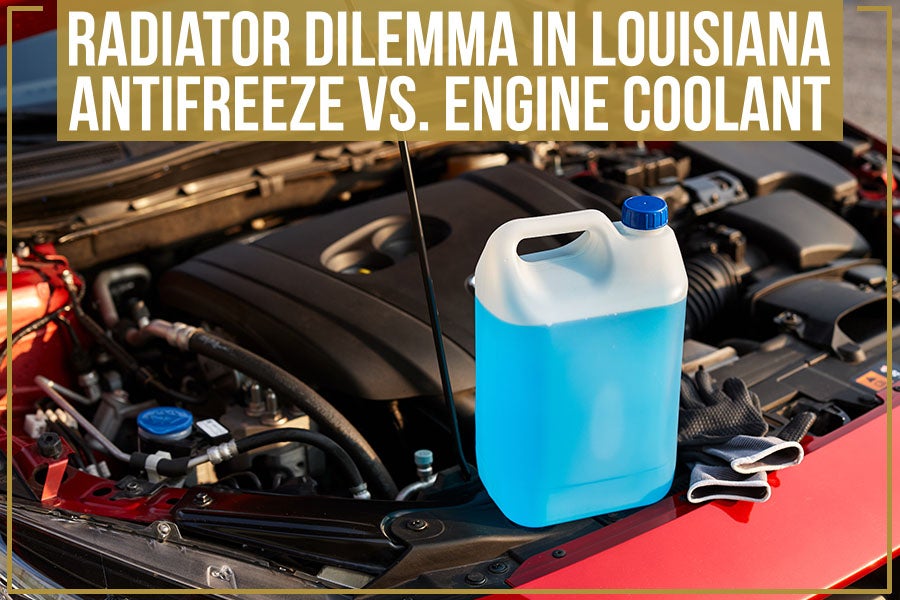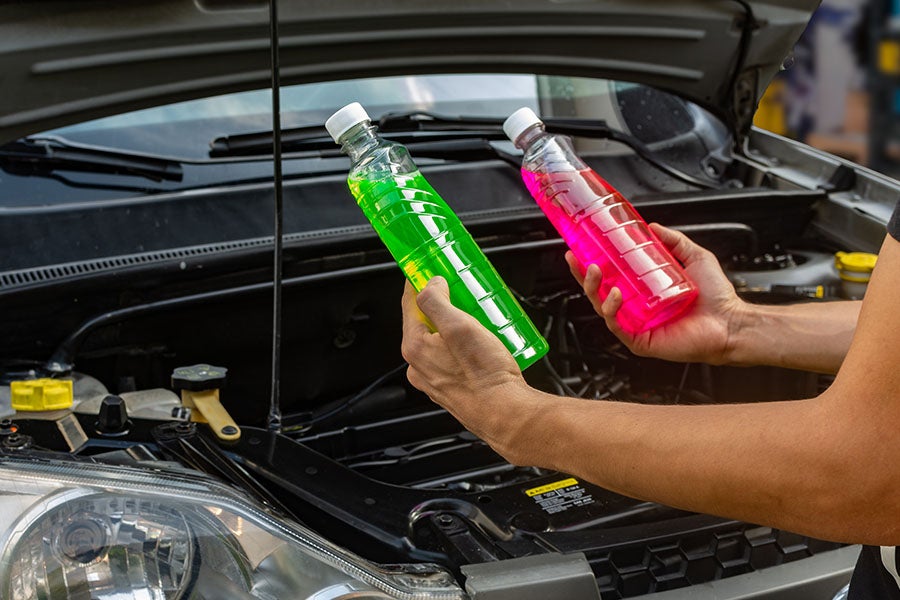Radiator Dilemma In Louisiana: Antifreeze Vs. Engine Coolant

Key Takeaways:
- A common goal of both antifreeze and coolant is to keep your engine at a consistent temperature.
- By adding water to antifreeze, you're essentially creating a mixture that has the best of both worlds: it can keep your engine cool in hot weather and prevent it from freezing in cold weather.
- A 50/50 solution of water and antifreeze is commonly used in cars, but you can go for 60 – 70% if it's freezing outside.
- Depending on how much you drive & the conditions you drive in, you may need to change your coolant more or less frequently.
Radiators are a necessary component of any car engine, as they help to keep the engine cool and prevent overheating. However, choosing the right radiator fluid can be a tricky task. Two of the most important fluids are antifreeze and engine coolant.
Let’s take a closer look at both the radiator fluids!
What is Antifreeze?
Antifreeze lowers the freezing point of water, making it ideal for use in cold weather conditions. It's usually made from ethylene glycol or propylene glycol and can be found in most auto parts stores.

What Is Engine Coolant?
Engine coolant is a mixture of water & antifreeze specifically designed to keep your engine running at a consistent temperature. Using the right ratio of water to antifreeze is important, as too much water can cause the engine to overheat. And too much antifreeze can let the engine freeze or overheat.
Antifreeze vs. Coolant: The Similarities
- Whether it's searing summer heat or frigid winter cold, both the fluids, help protect your car against extreme temperatures.
- Both are usually made from ethylene glycol or propylene glycol.
- One of the key ingredients in both engine coolant and antifreeze is water. This helps to keep the fluid from freezing or boiling over.
- Like most fluids in your car, you must regularly replace engine coolant and antifreeze to keep your vehicle running properly.
Antifreeze vs. Coolant: The Differences
- The main difference between antifreeze and coolant is that antifreeze is specifically designed to prevent freezing. In contrast, coolant is designed to avoid overheating.
- Engine coolant is a liquid circulated through the engine to keep it cool. On the other hand, antifreeze is added to the coolant to lower its freezing point. This is important because the coolant can freeze in cold weather, damaging the engine.
- Most coolants are made from water and ethylene glycol or propylene glycol. These chemicals help to keep the coolant from freezing, and they also protect the engine from corrosion. Antifreeze typically contains one of these glycols and other chemicals that further lower the freezing point.
- Engine coolant is less effective in extremely cold weather. Antifreeze helps to keep the coolant from solidifying in the engine in cold weather
- Engine coolant can cause corrosion if it leaks. Antifreeze is non-corrosive.
Diluting Antifreeze with Water: What's The Reason?
Ever wondered why you have to add water to your radiator? Well, there's a very good reason for this.
Water is a very good coolant but has a low boiling point. This means that it can start to evaporate at high temperatures, which isn't good for your engine. Antifreeze has a high boiling point, which can help keep your engine cool even in very hot weather.
Antifreeze also lowers the freezing point of water, which is why it's added to car radiators in the wintertime. This allows the water to remain in liquid form, even in very cold temperatures.
By adding water to antifreeze, you're essentially creating a mixture that has the best of both worlds. It can keep your engine cool in hot weather and prevent it from freezing in cold weather. So next time you top off your radiator, don't forget to add some water along with the antifreeze!
Getting the Right Ratios!
Most people are familiar with the basic 50/50 mix of water and antifreeze. It is commonly used in cars, but did you know that other ratios can be used to create a coolant that is better suited to your needs?
So, what's the best ratio for you? It all depends on your specific needs. If you're unsure which mix is right, ask your local mechanic or car dealership for advice.
What's Coolant Flush?
A coolant flush drains all the coolant from your car's system and replaces it with a new coolant. It's important to do this every few years to prevent your engine from overheating. Over time, the coolant in your car becomes contaminated with dirt, rust, and other debris. This build-up can cause clogs and blockages, preventing the coolant from doing its job.
A cooling system flush will remove all this build-up and restore your car's ability to regulate its temperature. In addition, a flush will also help to prolong the life of your engine by preventing corrosion and scaling.
How Often Should I Change My Coolant?
Depending on how much you drive & the conditions you drive in, you may need to change your coolant more or less frequently.
If you do much stop-and-go driving in hot weather, your coolant will degrade faster and need to be replaced more often.
Conversely, if you mostly frequent the highway in cooler weather, you may be able to go longer between changes.
It’s recommended to change it every 30,000 miles or two years!
The best way to know for sure is to check your owner's manual or ask your mechanic. They'll be able to tell you how often you should change your coolant based on your driving habits and the type of coolant you're using. So don't wait until your engine starts overheating - keep an eye on your coolant level.
Conclusion
So, there you have it - the difference between antifreeze and engine coolant. Both are important for running your engine smoothly, but they serve different purposes. Be sure to use the right fluid type for your car, and change it according to the recommended schedule. If you do that, your engine will stay nice and cool - no matter how hot it gets outside.
Supreme Chevrolet of Gonzales, serving Springfield, LA, always checks and top off all the fluids during routine maintenance visits. From engine oil to coolant and everything in between, we'll ensure your car has the right fluid levels. And if we see that any of them are low, we'll top them off so you can avoid expensive repairs down the road. So next time you're in for an oil change or tire rotation, ask us about our fluid level check service.
Schedule your service now!



